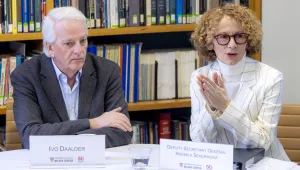AGREE
Strong Deterrent Against Russia: The prevailing position within the U.S. administration is that Russia currently has little interest in diplomatic negotiations with Ukraine and the West. As such, a formal NATO membership invitation to Ukraine is seen as a potent deterrent against further Russian aggression. Such a move could solidify Ukraine’s security and signal to Russia the disproportionately high costs of continued hostilities, potentially discouraging further military adventurism.
Political Signaling: A formal invitation to Ukraine at the 75th anniversary summit would serve as a powerful geopolitical message, underlining the United States’ enduring influence in the broader theater of geopolitics. It serves as a deterrent not only to Russia but also as a warning to other major powers such as China, indicating that unilateral actions will face significant opposition and considerable costs. Such a step would reaffirm the US’s commitment to supporting its allies and upholding international norms.
Moral Considerations: There is a strong moral imperative to further support Ukraine in its fight against unjust Russian aggression. This support is not just about geopolitics but also about standing up for the principles of sovereignty, territorial integrity, and the right of nations to choose their own path. NATO membership for Ukraine would be a concrete demonstration of these values, equipping Ukraine with necessary security guarantees and showing moral leadership on the world stage.
Economic Motivations: As sanctions against Russia continue to show limited results and an emerging shift towards a global economic order less centered on the US takes shape, there is an increasingly important need to demonstrate the relevance and influence of the West. By inviting Ukraine into NATO at the 75th anniversary summit, the US can reconsolidate its global economic posture and counter the narrative of US decline.
Ultimate Tool to End War: The argument for Ukraine’s accession to NATO is framed as potentially the most effective means to deter further Russian aggression and, ultimately, to bring an end to the conflict. Ukraine’s admission into NATO would fundamentally alter the strategic calculus for Russia, possibly leading to de-escalation as was seen in the case of Finland. Consequently, there could be a shift towards diplomatic resolutions.
Disagree
Lack of Bipartisan Support: The push to invite Ukraine to NATO at the 75th anniversary summit suffers from a significant lack of bipartisan support within the US, raising concerns about its feasibility and the potential for it to exacerbate existing political divisions—this is coupled with a lack of support amongst current NATO members. Without a unified position on the issue, efforts to support Ukraine’s NATO membership could falter. As a result, this could further undermine the US’s position on the world stage and embolden adversaries.
Questionable Effectiveness: There are serious doubts about Ukraine’s ability to change the course of the conflict with Russia, even with greater military support. Such skepticism suggests that, despite significant investments, a stalemate might persist, raising questions about the strategic value and long-term implications of supporting Ukraine’s NATO bid under current circumstances.
NATO Admission Requirements: Ukraine’s candidacy for NATO membership is complicated by its failure to meet all the Alliance’s entry criteria, especially concerning military standards. These deficiencies pose significant hurdles to membership and highlight the need for extensive reforms, which could delay or complicate the accession process.
Article 5 Commitments: The commitment to collective defense under NATO’s Article 5 is a cornerstone of the Alliance. However, there is uncertainty regarding the willingness of NATO members to extend this commitment to Ukraine, especially in light of the risks of a direct military confrontation with Russia. This hesitancy reflects broader concerns about the implications of expanding NATO’s security guarantees.
Escalation Risk: Ukrainian admission into NATO carries the risk of escalating the conflict with Russia, potentially leading to a wider confrontation that could draw NATO allies in. The direct implication of NATO in Ukraine’s defense might provoke an even stronger response from Russia and increase the likelihood of a broader conflict that could have significant human and economic costs. Even more, it could inch the conflict closer to a nuclear war.







